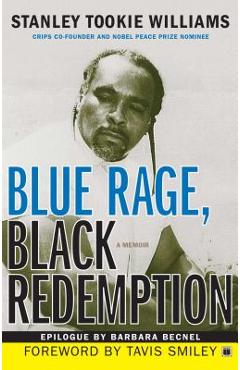Blue Rage, Black Redemption: A Memoir - Stanley Tookie Williams

Detalii Blue Rage, Black Redemption: A
libris.ro
122.76 Lei
136.4 Lei
Biography & Autobiography
Stanley Tookie Williams
Blue Rage, Black Redemption: A - Disponibil la libris.ro
Pe YEO găsești Blue Rage, Black Redemption: A de la Stanley Tookie Williams, în categoria Biography & Autobiography.
Indiferent de nevoile tale, Blue Rage, Black Redemption: A Memoir - Stanley Tookie Williams din categoria Biography & Autobiography îți poate aduce un echilibru perfect între calitate și preț, cu avantaje practice și moderne.
Caracteristici și Avantaje ale produsului Blue Rage, Black Redemption: A
- Departament: auto-moto-rca
- Ideal pentru iubitorii de mașini și motociclete.
- Conținutul acestui produs te ajută să întreții și să îmbunătățești performanțele vehiculului tău.
Preț: 122.76 Lei
Caracteristicile produsului Blue Rage, Black Redemption: A
- Brand: Stanley Tookie Williams
- Categoria: Biography & Autobiography
- Magazin: libris.ro
- Ultima actualizare: 28-10-2025 01:22:05
Comandă Blue Rage, Black Redemption: A Online, Simplu și Rapid
Prin intermediul platformei YEO, poți comanda Blue Rage, Black Redemption: A de la libris.ro rapid și în siguranță. Bucură-te de o experiență de cumpărături online optimizată și descoperă cele mai bune oferte actualizate constant.
Descriere magazin:
Williams co-founded the Crips in his L.A. neighborhood, but what began as protection became a notorious gang. A 1981 conviction sent him to death row, where he was executed in 2005. From his jail cell, he became a powerful anti-gang activist. A gripping tale of personal revolution by a man who went from Crips co-founder to Nobel Peace Prize nominee, author, and anti-gang activist When his L.A. neighborhood was threatened by gangbangers, Stanley Tookie Williams and a friend formed the Crips, but what began as protection became worse than the original gangs. From deadly street fights with their rivals to drive-by shootings and stealing cars, the Crips\' influence--and Tookie\'s reputation--began to spread across L.A. Soon he was regularly under police surveillance, and, as a result, was arrested often, though always released because the charges did not stick. But in 1981, Tookie was convicted of murdering four people and was sent to death row at San Quentin in Marin County, California. Tookie maintained his innocence and began to work in earnest to prevent others from following his path. Whether he was creating nationwide peace protocols, discouraging adolescents from joining gangs, or writing books, Tookie worked tirelessly for the rest of his life to end gang violence. Even after his death, his legacy continues, supported by such individuals as Archbishop Desmond Tutu, Snoop Dogg, Jesse Jackson, and many more. This posthumous edition of Blue Rage, Black Redemption features a foreword by Tavis Smiley and an epilogue by Barbara Becnel, which details not only the influence of Tookie\'s activism but also her eyewitness account of his December 2005 execution, and the inquest that followed. By turns frightening and enlightening, Blue Rage, Black Redemption is a testament to the strength of the human spirit and an invaluable lesson in how rage can be turned into redemption.

Produse asemănătoare

Ochelari Polarizanti Fox Rage Transparent Black Brown Lens Mirror Blue
![]() claumarpescar.ro
claumarpescar.ro
Actualizat in 05/11/2025
91.9 Lei

Blue Rage, Black Redemption: A Memoir - Stanley Tookie Williams
![]() libris.ro
libris.ro
Actualizat in 28/10/2025
122.76 Lei
Produse marca Stanley Tookie Williams

Blue Rage, Black Redemption: A Memoir - Stanley Tookie Williams
![]() libris.ro
libris.ro
Actualizat in 28/10/2025
122.76 Lei